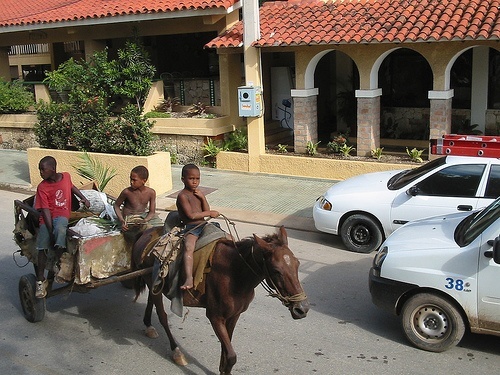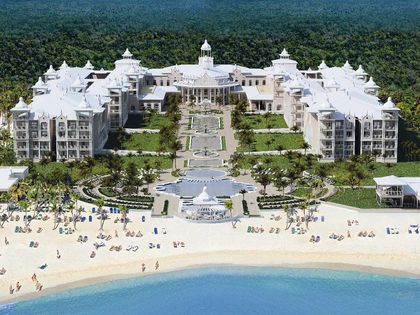
Throughout the world, children are born in disadvantaged neighborhoods. Basic opportunities, especially educational opportunities, are lacking. Because of this, children reach adulthood without the education necessary to be accepted to a good university, and without the vocational training necessary to obtain a skilled job. These children then have no job or a low-paying unskilled job, turn to crime or prostitution to survive, have more children, and the dead-end cycle continues. Outreach 360, the nonprofit organization I interned with, works to create choices for children in the developing world through the promotion of English, literacy, and community health. The organization was established in 1995.

My internship with Outreach 360 was definitely a life changing experience. My primary task in the organization was to teach English to Dominican children ranging from 2nd to 7th grade. I had visited the Dominican Republic prior to my internship as a tourist in Punta Cana in 2009.
My experience with Dominicans, besides a guided tour off the grounds of the resort, was limited to that of a worker-client relationship. Going to Jaibon and Monte Cristi on the northern side of island really opened my eyes to the life of most Dominicans.
Experience in the Dominican Republic Begins
My first day in the D.R. started off very rocky. I arrived in Santiago at 12 in the afternoon. Getting off the plane and leaving the airport, I was overwhelmed by the realization that I had travelled alone to a country where a majority of the people would not speak English. I met up with the program director, Tom, and another volunteer and began my three-hour drive to my job site, Monte Cristi. Immediately I was thrown into a situation where I was packing scabies and gastrointestinal medication into a truck after learning that every Dominican has a bacterial infection which violent diarrhea. Thus I was informed that I could not drink or even brush my teeth with the water.
Dominicans are affected by so many communicable diseases that health workers often treat one child and send them home to a family that is also infected. Therefore in order to truly treat a problem medicine must be provided for entire families. This is not an easy task when program funding is low and mostly based on the program donations of volunteers.
I was quickly informed by my travelling mate, Stacy, that this would be far from the luxurious stay I had three years ago. I had to become acclimated to cold showers as only the tourist areas like Punta Cana had hot water. Electricity rates in the Dominican Republic are so expensive that most people take military showers: I would get under freezing cold water, wet my body, turn off the water, soap up, and turn it back on to rinse off.
All of this should be completed within five minutes. Other lifestyle changes that I had to become accustomed to were: if it’s brown flush it down and if it’s yellow let it mellow. I also had to throw away toilet paper instead of flush. As a germaphobe and lover of steaming hot showers I began to question how I would make it through three weeks in the Dominican Republic.

I arrived in Monte Cristi around 5 o’clock. After being met by the Country Director, Amanda, I was informed that there was a mix-up and instead of staying in the off the grid former hotel in the city, I would be staying on a farm in Jaibon and teaching at the all-boys orphanage school there.
Traveling at night with two men who barely spoke English did not make me feel very comfortable but I was assured by Amanda that they had been working with Outreach for years. I tried to make conversation with Andre and Miguel about baseball (the Yankees) and Reggaeton singers while he overtook trucks and motorcycles on graveled roads often playing chicken with opposing traffic. The scariest point of my travel from Monte Cristi to Jaibon was the multiple times I got stopped at various military checkpoints by armed policía questioning whether I was American. Jaibon is on la frontera, or the border, of Haiti and Haitian immigration is prohibited.
In Jaibon, I had no sense of time. Hours seemed to fade into the next and I had limited phone service and access. The orphanage and school in Jaibon is run by a woman named La Tia. The orphanage is primarily supported by the funds produced by Outreach 360 and currently houses fifteen boys. The farm is currently developing a banana plantation that has the possibility to bring $80,000 in revenue to the orphanage. Though it will take a lot of workers and money to develop the land, if accomplished it will be a great step towards the goal of self-sustainability.
Meeting Local Orphanage Boys Was a Highlight Experience in the Dominican Republic
The story of the boys at the orphanage is an interesting one. Most of the boys at the orphanage are not true orphans in the sense that they have lost both of their parents. The boys were dropped off by parents or by the state due to their parents not being able to take care of them. The boys stay at the orphanage until they graduate secondary school.
Prior to my first day of teaching at Laguna Salada and in La Tia’s school, I was gripped by a certain amount of trepidation. Though I had taken three years of Spanish in high school and a semester’s worth of intermediate understanding at the college level, I had a high level of safe awareness when speaking the language and could not understand when people spoke rapidly. The first ten minutes of class were rocky as we had made a lesson plan for 2nd and 3rd graders and were told upon arrival that we would be teaching 7th graders. I assumed there would be a major difference in education level and knowledge of English.
This turned out not to be the case. Our lesson plan consisted of teaching emotions and types of weather, as well as greetings. The teacher in the class admitted to me in Spanish that she only a little English. I found this ironic due to the fact that Dominican teachers are required by law to teach English. My teaching group really looked to me to translate the activities as they did not know any Spanish. I found myself stepping up into leadership positions throughout the week in Jaibon and the following weeks in Monte Cristi.
On the Friday of my first week in Jaibon, we visited Dajabón for market day. I stood on the bridge overlooking Massacre River, the site where fifteen thousand Haitians were massacred while trying to flee back to in 1960 under the orders of General Trujillo. They were massacred in an attempt to stop the “pollution” of the Dominican people. The relative destitution of the Haitians as they ran across the bridge separating the Dominican Republic and Haiti gathering food and basic necessities at the market was staggering.
The market opens Mondays and Fridays and closes at 3:30 p.m. On one end of the bridge stood armed Dominican police—and on the other: Haiti. Half ways on the bridge were peace-keepers from Uruguay. The sites and smells of the frantic market, as pregnant women and children carried food on their heads, is something I will never forget.
Experience in the Dominican Republic’s Monti Cristi
I spent the remainder of my time in Monte Cristi, a small town with a big city feel further south of the Haitian border. Travelling throughout Monte Cristi, I was able to absorb a lot of the culture and interact with the neighborhood. The Dominican Republic has a relationship as opposed to task-oriented culture. It is customary for strangers to greet one another whether they know the other or not. Lateness in business meetings often indicates the person’s level of importance. I believe that the knowledge I gained from being immersed in both the language and culture will help me to navigate the cultural minefields that is the world of diplomacy.
In Monte Cristi, I lived at the Coconut, a former hotel and English Institute that was converted to house volunteers. During the day, I taught in the English Institute and worked at a camp in El Parque Manolo Tavarez. In the morning, we went into the poor Solomon Jorge community a few blocks away, to collect children for camp. The community was close to the salt flats where many of the children’s parents worked. Chickens, pigs, and dogs roamed the street together and many of the children wore the same clothes daily.
At camp, I focused on developing Spanish literacy reading such books as Eres Tu Mi Mama? and El Gato Ensombrerado. In the afternoons, I worked at the English Institute teaching level ¾ in four classes. The Institute was a complete immersion experience where children were prohibited from speaking Spanish.
I learned the difficulty of teaching the English language. I taught such concepts as when to use –er and more, superlatives, and a visit to the doctor’s office. Explaining such concepts as a cardiogram and stethoscope were daunting tasks considering that most Dominicans don’t have health insurance—meaning there were limited reference points for what takes place during a normal checkup.
On the night before I left Monte Cristi, we watched a documentary called “The Price of Sugar” on the works of a priest to improve the slave-like condition of Haitian cane workers in the bataes. Haitian workers are brought into the Dominican Republic on the promise of a better life by working in the cane fields. However, they get paid in vouchers and aren’t allowed to move freely throughout the country.
The cramped bataes are guarded by armed guards and children born there are technically not Dominican or Haitian. As I learned in Professor Rubenstein’s World Religions course, as a stateless people the Haitian workers are subject to a number of injustices and indignities. The racial and cultural tension present in the documentary could be observed in the interactions of the Dominican and Haitian children who would play together, but often turn to racially derogatory and incendiary comments during an argument.
Reflecting on My Experience in the Dominican Republic
As a Global Development and Peace student, I was able to observe how some of the theoretical issues of development occur. How does education effect development and how does a lack of diversification in industry limit the employment access? Also working for an NGO, I became a firsthand witness of the in-house issues such as funding and the rationing of supplies, and the difficulty in reaching the goal of self-sustainability. Essentially, my experience in the Dominican Republic was one of both personal and professional growth, solidifying my desire to work in the field of global development.
Leave a Reply